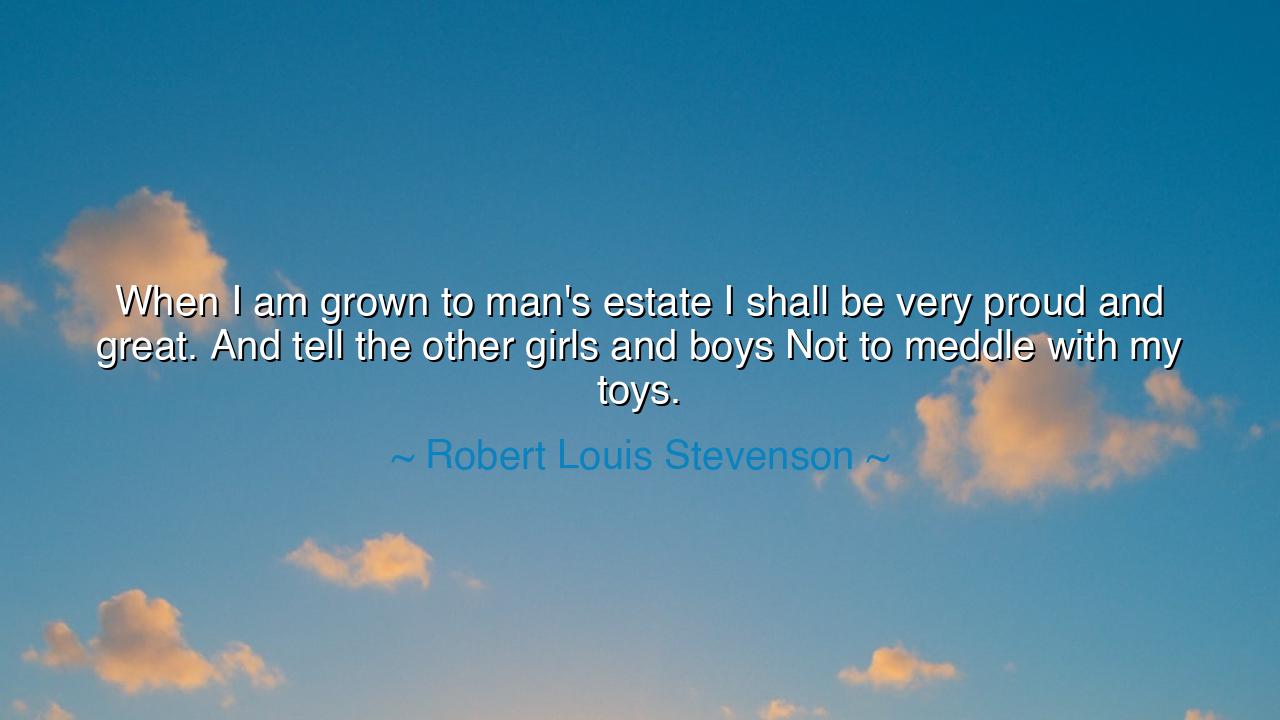
When I am grown to man's estate I shall be very proud and great.
When I am grown to man's estate I shall be very proud and great. And tell the other girls and boys Not to meddle with my toys.






“When I am grown to man’s estate I shall be very proud and great. And tell the other girls and boys, not to meddle with my toys.” Thus wrote Robert Louis Stevenson, the gentle poet of childhood and dreamer of eternal youth. These words, drawn from his collection A Child’s Garden of Verses, are spoken in the voice of a child imagining adulthood. Yet beneath their simple melody lies a profound reflection on innocence, pride, and the passage of time — a mirror held up to the human heart as it journeys from wonder to wisdom.
In the eyes of the child, growing up is the golden promise of power and importance. To be “grown to man’s estate” is to stand tall in the world, to have authority, to be free. But in Stevenson’s tender irony, the very next lines reveal the seed of folly: the child imagines that with greatness will come possession and pride, and that the freedom of maturity will consist in forbidding others to touch what is his. It is a gentle prophecy of what often becomes of us all — that in seeking greatness, we forget the generous spirit of our youth. The toys of childhood become the ambitions and treasures of adulthood, and we guard them fiercely, fearing loss more than we love sharing.
Stevenson, who lived with fragile health and deep sensitivity, understood the paradox of human growth. He saw that in becoming “proud and great,” men and women often lose the very innocence that made life beautiful. The toys change form — from wooden blocks to gold, from playthings to possessions — but the possessiveness remains. What was once a child’s instinct to protect becomes an adult’s selfishness and vanity. The poet’s voice, though playful, is filled with a knowing sadness, for he recognized how the bright flame of childhood generosity dims under the shadow of worldly desire.
Consider the tale of King Midas, the ancient ruler who wished that all he touched might turn to gold. To him, such power seemed the crown of greatness — a grown man’s ultimate toy. But when his wish was granted, he discovered that his gift was a curse: food, family, and life itself turned to lifeless metal in his grasp. In his pursuit of pride, he destroyed joy. Stevenson’s child, in his innocent boast, walks the same path — though unaware — from play to possession, from wonder to warning. Both remind us that greatness without humility becomes its own prison.
Yet within this poem lies not only warning, but hope. Stevenson’s words invite us to look back, to remember the child within — the one who found joy not in owning but in imagining, not in guarding but in sharing. The poet calls us to recover that simple freedom, that capacity for delight. To “not meddle with my toys” is the instinct of the ego; to invite others to play is the wisdom of the heart. And in this, perhaps, lies the true definition of maturity — not the accumulation of power, but the rediscovery of innocence.
Stevenson wrote these lines at a time when the world worshipped progress, invention, and conquest — the idols of Victorian ambition. Yet his voice rose softly against that tide, reminding his readers that humanity’s greatness is not measured by what it holds, but by what it gives. He saw the tragedy of adults who forgot how to play, who built empires but lost tenderness, who could command nations but not wonder at a butterfly’s wing. Through the simplicity of a child’s rhyme, he whispered a truth that kings and scholars alike forget: that greatness without gentleness is empty.
Therefore, O listener, take this teaching to heart: do not grow so proud that you forget how to play. The world will tempt you to gather toys — wealth, reputation, possessions — and to guard them as the proof of your worth. But remember Stevenson’s child, whose dream of greatness hides the seed of pride. Strive instead to grow in wisdom, not vanity; in kindness, not control. Share your toys, whatever form they take — your talents, your time, your love — for that is the mark of a soul truly mature.
And so, let the final lesson be this: to grow up well is not to leave childhood behind, but to carry it within you. The child who learns to play becomes the adult who learns to create, to forgive, to rejoice. Keep the laughter, but shed the pride. Be great, but never forget to be good. For in the end, it is not the one who guards his toys who is mighty, but the one who, like Stevenson himself, gives them to the world — and calls all mankind to share in the eternal play of life.






AAdministratorAdministrator
Welcome, honored guests. Please leave a comment, we will respond soon